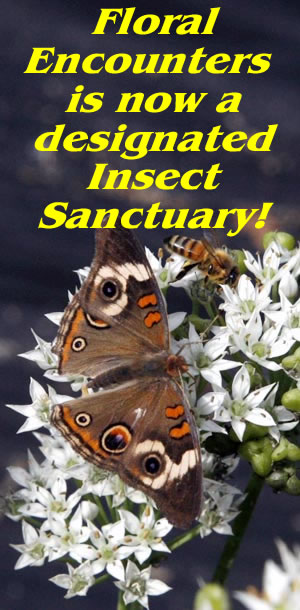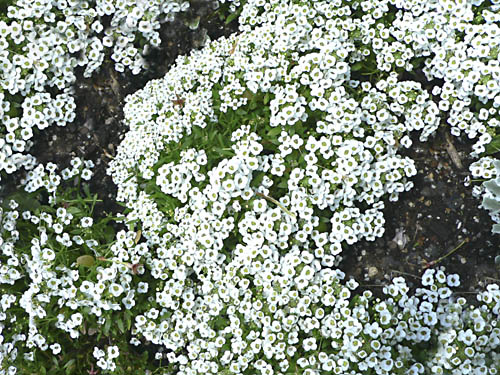Alyssum is a very tough little full sun plant that no garden should be without. It germinates readily and can grow in almost on almost any soil that is well drained although it prefers poorer soils and will produce more flowers when planted there. Too much rich soil brings more leaves and less flowers. Alyssum makes a wonderful ground cover, a living mulch under prized plants where it beats out the weeds. It can even be used to cover whole areas like a lawn of flowers. Its continuous production of sweet smelling flowers is a magnate for pollinators including butterflies, bees, native bees and even humming birds. All these insects also attract those who eat them, so if planted around prized plants such as vegetables or roses the predators will also clean up any insect pests that are lurking there. Alyssum is very salt tolerant and is a great plant for shore side gardens (hence its name maritima) where it will bloom on almost pure sand. It will grow out of cracks in a blacktop driveway, on almost pure gravel and in other areas where no other plant seems able to find water. Its fairly drought tolerant but will need some water if there is no rain. Once planted needs no maintenance just enjoy all the beautiful flowers. In warmer zones it will flower all year but above zone 7 its dies back in winter. Deer don't seem to eat it much, rabbits will if there is nothing else. It's reported as edible, it tastes like broccoli, so it's your choice if you consider that edible or not.
Can be either grown by direct sowing or indoors for early start.
We recommend direct sowing for this plant as it produces much stronger more robust plants and it germinates quickly and easily. Often pot grown plants if not given sufficient light and airflow tend to be straggly and weak and take more time to recover once planted out so time gained by early sowing is lost. However if growing for use in planters, hanging baskets or transplanting to mulch starting indoors is best. Try to get transplants outside - in their pots - to harden off as soon as the frost is past so plants can toughen up and begin producing flowers as soon as possible. For more details on growing seeds see our General Growing Instructions.
Direct sow. Remove all the weeds and other items from the desired location rake the ground and ensure there is a coating of fine soil. Sprinkle the seeds carefully on the ground at a distance of about 3" (7.6cm) apart then gently step on the to press them down and give good contact with the soil. Mist lightly and keep moist until the seedlings germinate. Do not water with a hard hose setting as this can wash all the seeds into one location resulting in uneven flower spacing. Seedlings can be transplanted afterwards but its more time and effort.
If planting on a slope take care to ensure good adherence to the soil as heavy rains - or hard watering - can wash the seeds to the base of the slope.
This is an ideal plant for shore areas as its is fairly salt tolerant - salt in the air not full salt spray. It can be grown in large areas to form snowy mounds covering otherwise unused ground or around other plants as a sort of living mulch. Once in full bloom the spreading branches keep moisture from evaporating as much which is beneficial to all other plants. The masses of blooms attract bees, butterflies and other beneficial insects so planting near or around vegetables as a much also aids in them. It can be planted in mulched areas to make them look nicer and give more color to the garden.
Where and how it grows will depend on your climate. If you usually have plenty of rain then it can be encouraged to grow in cracks in walls, even on almost pure sand. In areas that don't get as much water then a lusher soil will be needed and added water required. Whatever your location it's a great plant to have.
Sweet Alyssum has a mounding flowing habit so it is great for hanging baskets or cascading out of planters. It will grow almost anywhere there is full sun.
Space plants at least 4 inches (10 cm) apart they will grow to 6-10" (15-25cm) and form one continuous mat. Alyssum does better on poorer soils so do not feed the plants much as this can encourage leaf grow rather than flowers and often this may trap too much moisture and the plants can rot. For the same reason don't overwater, once a week should be enough and less if its rained. In many places no care at all will be needed once the plants have started to grow.
How to sheer. If you have just a few plants, a pair of scissors will do the job. If a large plot or even a 'lawn' then you can always set the mower on a high space setting and cut the whole lot down. Test on one area before you cut all the plants to make sure you are happy with the results. Medium jobs are best done with sheers.
Sheering can be time consuming and cause backache we don't recommend it unless you really feel its necessary.








